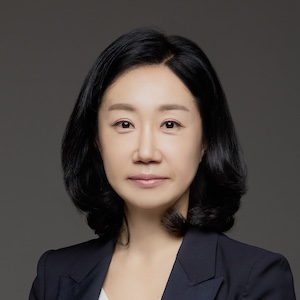Ji-Young Lee Associate Professor Foreign Policy & Global Security
- Additional Positions at AU
- C.W. Lim and Korea Foundation Professor of Korean Studies
- Degrees
- PhD, Government, Georgetown University; MA, Security Studies, Georgetown University; MA, Political Science, Seoul National University; BA, Political Science and Diplomacy, Ewha Womans University
- Bio
- Trained as a political scientist, Dr. Ji-Young Lee has written on Asian historical international relations, regional security order and the U.S. alliance network in Asia, and South Korean foreign policy. She is the author of "China’s Hegemony: Four Hundred Years of East Asian Domination" (Columbia University Press, 2016). Her current book project, "The Great Power Next Door" (under contract with Columbia University Press), is a historically informed analysis of when and how China has chosen to militarily intervene in the Korean Peninsula. She previously taught at Oberlin College as a Mellon Postdoctoral Fellow in Politics and East Asian Studies. Outside academia, she served as the Korea Policy Chair and a Senior Political Scientist at the RAND Corporation and was a non-resident James Kelly Korean Studies Fellow at the Pacific Forum CSIS.
- See Also
- Professor Lee's website
- For the Media
- To request an interview for a news story, call AU Communications at 202-885-5950 or submit a request.
Teaching
Fall 2024
-
SIS-676 Sel Topics in Cross-Natl Study: Korean Peninsula/U.S.-China
-
SISU-296 Selected Topics:Non-Recurring: Asia/Historical Intl Relations
Scholarly, Creative & Professional Activities
Honors, Awards, and Fellowships
- The Academic Research Grant, the Academy of Korean Studies, 2019-2020.
- The Korean Studies Grant 2013 (Competitive Research Grant), the Academy of Korean Studies, 2013-2014.
- The East Asia Institute (EAI) Fellowship, 2013-2014.
- A Korea Foundation-Mansfield Foundation Scholar, the U.S.-Korea Scholar-Policymaker Nexus, 2013-15.
- Andrew W. Mellon Postdoctoral Fellowship in Politics and East Asian Studies, Oberlin College, 2009-11.
- The East-West Center POSCO Visiting Fellowship, 2009.
- The Jill Hopper Memorial Fellowship, Georgetown University, 2008-09.
- James A. Kelly Korean Studies Fellowship (Nonresident), Pacific Forum CSIS, 2010-2011.
Professional Presentations
- “South Korea’s Views on the US, Alliance, and International Order,” Worldviews on the United States workshop, 13-15 November 2018, Canberra.
- "The Making of Chinese Hegemony in Early Modern East Asia," UC Berkeley, 5 Oct. 2016; University of British Columbia, 9 Nov. 2017.
- "The Chinese World Order in Practice," the Social Science Research Council (SSRC) Conference on Inter-Asian Connections, 2-5 Oct. 2013, Istanbul; Keio University, 11 Dec. 2014, Tokyo; Fudan University, 16 Dec. 2014, Shanghai; Beijing University, 19 Dec. 2014, Beijing.
- "U.S.-ROK Alliance, China, and the Rebalancing to Asia," the annual convention of the International Studies Association, 26-29 Mar. 2014, Toronto.
- "Understanding Hierarchy in International Relations," the annual convention of the International Studies Association, 3-6 Apr. 2013, San Francisco.
Selected Publications
- China's Hegemony: Four Hundred Years of East Asian Domination (New York: Columbia University Press, 2016).
- "North Korea, Missile Defense and the US-China Security Dilemma," The Pacific Review, vol. 35, no. 4 (July 2022), pp. 587-616 (an advance article, December 2020); with Eleni Ekmektsioglou.
- "Hegemonic Authority and Domestic Legitimation: Japan and Korea under Chinese Hegemonic Order in Early Modern East Asia," Security Studies, vol. 25, no. 2 (June 2016), pp. 320-52.
- "Contested American Hegemony and Regional Order in Postwar Asia: the Case of the Southeast Asia Treaty Organization," International Relations of the Asia-Pacific, vol. 19, no. 2 (May 2019), pp. 237-67 (an advance article, December 2017).
- “Decoupling from China: How U.S. Asian Allies Responded to Huawei Ban,” Australian Journal of International Affairs (an advance article, January 2022); with Eugeniu Han and Keren Zhu.
- "Diplomatic Ritual as a Power Resource: the Politics of Asymmetry in Early Modern Chinese-Korean Relations," Journal of East Asian Studies, vol. 13, no. 2 (August 2013), pp. 309-36.
- “Everyday Politics of “Dokdo” and South Korean National Identity: An Analysis of Education, Media, and Civil Society,” The Korean Journal of International and Comparative Law, vol. 7, no. 1 (June 2019), pp. 67-87; with Jaehyun (Albert) Lee.
- “South Korea’s Strategic Nondecision and Sino-US Competition,” in Ashley Tellis, Alison Szalwinski, and Michael Wills, eds., Strategic Asia 2020: U.S.-China Competition for Global Influence (Seattle: National Bureau of Asian Research, 2020).
- The Geopolitics of South Korea–China Relations: Implications for U.S. Policy in the Indo-Pacific (Santa Monica: RAND Corporation, 2020).
- “The Tribute System and the World Imagined in Early Modern East Asia,” Millennium: Journal of International Studies, vol. 50, no. 1 (2021), pp. 256-266 (an advance article, November 2021).
- "Politics of North Korea," in Richard Valelly, ed., Oxford Bibliographies: Political Science (New York: Oxford University Press, 2013); with Victor Cha.
- "Historical Memory and Reconciliation: A South Korean Perspective," in Tatsushi Arai, Shihoko Goto, and Zheng Wang, eds., Contested Memories and Reconciliation Challenges (Washington, DC: The Woodrow Wilson International Center for Scholars, 2015), pp. 37-47.
- "Historically Speaking: Japan-ROK relations and U.S. Asia Strategy," Japan Chair Platform, the Center for Strategic and International Studies (Dec. 16, 2013).
- "Japan-Korea Relations: Hitting an All-Time Low,” Comparative Connections, vol. 21, no. 1 (May 2019), pp. 105-114; with Mintaro Oba.
AU Experts
Area of Expertise
North Korea, South Korea, China, East Asian international relations, security, and diplomatic history
Additional Information
Dr. Ji-Young Lee’s research focuses on East Asian international relations, security, and diplomatic history. Her book, "China's Hegemony: Four Hundred Years of East Asian Domination" (Columbia University Press, 2016) examines how Chinese hegemony in early modern East Asia was not just a product of Chinese power but was shaped by its neighbors' domestic legitimation strategies. Her second project investigates how China’s rise impacts the American-led international order, specifically through the lens of the U.S. alliance system in East Asia and China. At SIS, she teaches courses on Asian international politics, Korean politics and foreign policy, and North Korea and international security.
For the Media
To request an interview for a news story, call AU Communications at 202-885-5950 or submit a request.

